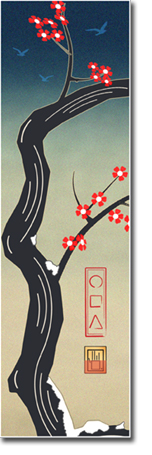On The Way: The Daily Zen Journal
Wisdom and Ignorance
Buddha
In the evening Rahula finished his meditation practice, went to the Buddha and asked, “O World-Honored One, how should one master mindful breathing, and what great benefit is there?”
The Buddha answered as follows:

“Rahula, go to a grove or under a tree or to a house wherein no one lives, and sit with your body straight and your mind correct. Whether exhaling or inhaling, be single-minded; when taking a long breath, be aware that you are taking a long breath. When taking a short breath, be aware that you are taking a short breath.
“When exhaling long, be aware that you are doing so. When exhaling short, be aware that you are doing so. You will be aware of your whole body when you inhale and exhale. You will be calm in body as you inhale and exhale. You will feel joy as you inhale and exhale. You will train yourself to calm your mind as you inhale and exhale.
“Your mind will be free of attachments as you inhale and exhale. You will contemplate impermanence and freedom as you inhale and exhale. If you are mindful in this way of your breathing, and you practice this over and over, there will be great benefit; your final breath will disappear, not in the midst of unconsciousness, but in the midst of consciousness.

“Rahula, this, then is the way in which you should master mindful breathing. Furthermore, you should master the practice called Equal Earth. If you master this practice, your mind will not cling to the emotions of liking and disliking that arise. Whether you place something pure or impure on the great earth, it does not hate or dislike it.
“Furthermore, you should master the practice called Equal Water. If you master this practice, your mind will not cling to the emotions of liking or disliking that will arise. Whether you put something pure or impure into water, it does not hate or dislike it; let your mind be so also.

“Rahula, further master the practices of compassion, mercy, joy, and equanimity. If you master the practice of compassion, you can avoid anger. If you master the practice of mercy, you can avoid anguish.
“If you master the practice of joy, you can avoid frustration. If you master the practice of equanimity, you can avoid the will to injure.
“Rahula, further master the meditation on impure objects and the meditation on impermanence. If you master the meditation on impurity, greed will disappear. If you master the meditation on impermanence, self-pride will disappear. Rahula, these are the great benefits you will gain by mastering mindful breathing.”
Rahula was joyful over the World-Honored One’s teachings.
Buddha
Excerpted from Buddha-Dharma – The Way to Enlightenment





When times are turbulent and the winds of change are blowing in multiple directions, it is helpful to return to foundation practices.
While sounding deceptively simple, awareness of breathing alone is a worthy lifetime practice. We can manage to watch for brief periods, and then we are lost again in phenomena. However, the breath is always with us, and it gives us a concrete place to return to.
Just to contemplate the practices of compassion, mercy, joy, and equanimity, is uplifting in and of itself.
Our priorities shift and we return to a more elevated place in life. To act from a heart of compassion and forgiveness; to jump over our small concerns for the greater good, and to focus on bringing joy to others, transforms the ordinary into truly extraordinary life.
These are the times when practice really does count….what else can guide us through the upheaval with equanimity and the ability to see the best way to respond to the here and now?
May we all remain effectively mindful,
Elana, Scribe for Daily Zen